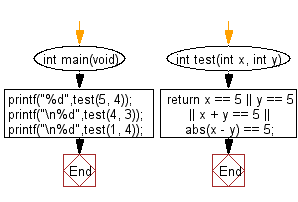C Exercises: Accept two integers and return true if either one is 5 or their sum or difference is 5
C-programming basic algorithm: Exercise-18 with Solution
Write a C program that accept two integers and return true if either one is 5 or their sum or difference is 5.
C Code:
#include <stdio.h>
#include <stdlib.h>
int main(void){
printf("%d",test(5, 4));
printf("\n%d",test(4, 3));
printf("\n%d",test(1, 4));
}
int test(int x, int y)
{
return x == 5 || y == 5 || x + y == 5 || abs(x - y) == 5;
}
Sample Output:
1 0 1
Pictorial Presentation:
Flowchart:

C Programming Code Editor:
Contribute your code and comments through Disqus.
Previous: Write a C program to compute the sum of the two given integers. If the sum is in the range 10..20 inclusive return 30.
Next: Write a C program to test if a given non-negative number is a multiple of 13 or it is one more than a multiple of 13.
What is the difficulty level of this exercise?
Test your Programming skills with w3resource's quiz.
C Programming: Tips of the Day
Static variable inside of a function in C
The scope of variable is where the variable name can be seen. Here, x is visible only inside function foo().
The lifetime of a variable is the period over which it exists. If x were defined without the keyword static, the lifetime would be from the entry into foo() to the return from foo(); so it would be re-initialized to 5 on every call.
The keyword static acts to extend the lifetime of a variable to the lifetime of the programme; e.g. initialization occurs once and once only and then the variable retains its value - whatever it has come to be - over all future calls to foo().
Ref : https://bit.ly/3fOq7XP
- New Content published on w3resource:
- HTML-CSS Practical: Exercises, Practice, Solution
- Java Regular Expression: Exercises, Practice, Solution
- Scala Programming Exercises, Practice, Solution
- Python Itertools exercises
- Python Numpy exercises
- Python GeoPy Package exercises
- Python Pandas exercises
- Python nltk exercises
- Python BeautifulSoup exercises
- Form Template
- Composer - PHP Package Manager
- PHPUnit - PHP Testing
- Laravel - PHP Framework
- Angular - JavaScript Framework
- Vue - JavaScript Framework
- Jest - JavaScript Testing Framework
